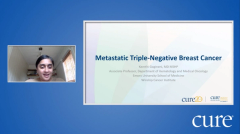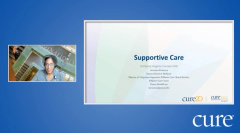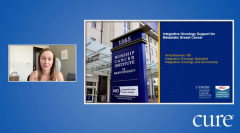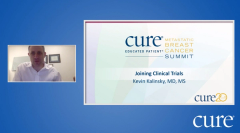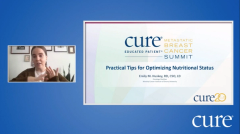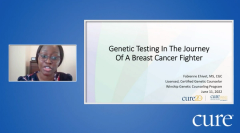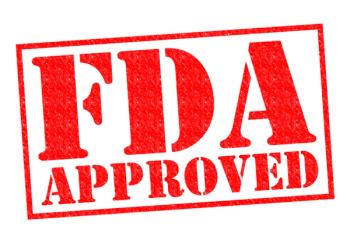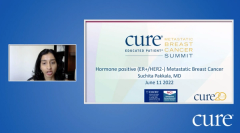
Educated Patient® Metastatic Breast Cancer Summit Metastatic Triple-Negative Presentation: June 11, 2022
Watch Dr. Keerthi Gogineni, from Emory University School of Medicine, discuss the management of triple-negative disease, during the CURE Educated Patient Metastatic Breast Cancer Summit.
A diagnosis of metastatic triple-negative breast cancer thrusts patients into a space where they are likely to face many challenges along a long journey, according to a speaker at CURE®’s recent Educated Patient® Metastatic Breast Cancer Summit.
Dr. Keerthi Gogineni, an associate professor in the Department of Hematology and Medical Oncology at Emory University School of Medicine in Atlanta, provided detailed information on the disease as well as highlighted various factors that patients need to be aware of.
Overcoming Frustrations
What frustrates patients and providers in the triple-negative breast cancer space, according to Gogineni, is discussions surrounding the disease almost always revolve what it’s not.
For instance, the 10% to 15% of patients with breast cancer that have the triple-negative subtype have tumors that lack the hormones estrogen and progesterone and/or the HER2 gene.
“Drugs that we normally use to target those receptors aren't really going to help patients who've got triple-negative disease,” she said during the presentation.
However, in the past few years, researchers have started to identify a few targets in patients with triple-negative breast cancer that have opened them up to receiving more effective therapies outside of cytotoxic chemotherapy treatments.
Looking for Targets
Before any treatment decision is made, Gogineni strongly encouraged that every patient undergo a variety of tests to identify if any targetable mutation is present in their tumor.
“When I talk about targets, what I mean is the presence or absence of a change, or too much of a certain protein in the tumor,” she said.
Gogineni explained that there are multiple ways to test for targetable mutations. For instance, patients may undergo a more invasive procedure that consists of a needle biopsy of the tumor that has metastasized (or spread) to surround parts of the body such as the liver or the lungs. Or, she said, patients may have the option to receive something less invasive such as a blood test or genetic testing.
A Number of Treatment Options
The first type of treatment Gogineni highlighted was antibody drug conjugates. She explained that antibody drug conjugates can be thought of as a type of smartphone that help drive chemotherapy toward the specific cancer cells that need to be targeted and away from normal cells. This process, she said, may mean fewer side effects for patients.
One such antibody drug conjugate Gogineni explored is Trodelvy (sacituzumab govitecan-hziy).
Another treatment option Gogineni discussed off the heels of a major medical conference was Enhertu (fam-trastuzumab deruxtecan-nxki).
The trial she was highlighting is known as the phase 3 DESTINY-Breast04 study. In this study, enrolled patients had metastatic breast cancer that had a small amount of HER2 signal on the surface of their tumor.
Although most of the women enrolled onto the trial had hormone receptor-positive disease, approximately 10% of the study population did not. Gogineni noted that the patient population that did not have hormone-receptor positive disease would normally be identified as triple negative.
In this trial,
Gogineni also discussed immunotherapy options available to patients including Keytruda (pembrolizumab). She noted that
Additionally, trial results showed that the newly approved regimen resulted in a 37% decrease in the risk of disease progression before definitive surgery, local or distant recurrence, another cancer or any-cause death.
Trust and Discuss
Gogineni concluded her presentation by saying that it is essential that patients triple-negative breast cancer find a care team they trust.
“There's a lot of new information that's coming out and trying to decipher that takes a careful discussion,” she said. “(Also,) ask about genetic testing. If you've not had this done yet, ask about whether testing for other targets either on a biopsy or blood would be useful for you.”
For more news on cancer updates, research and education, don’t forget to

